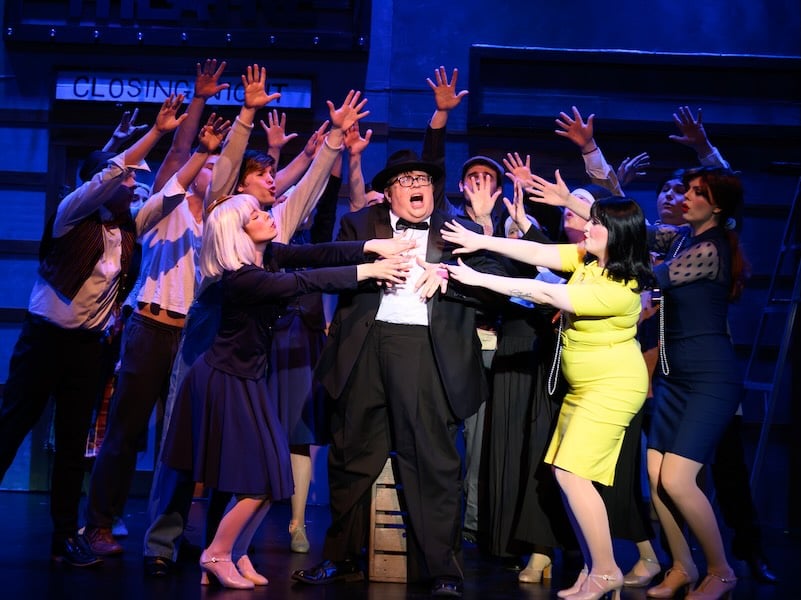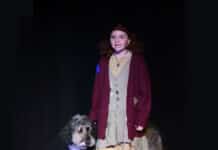It was outrageous, offensive, and insulting, not to mention over-the-top silly, and I loved every minute of it. Reston Community Players has mounted a brilliant, uproariously funny, and intricately detailed production of Mel Brooks’ The Producers. It’s a must-see event on your local theater calendar, many aspects of which I fully expect to show up at the next Watch Awards.
The plot outline is by now well-known. Formerly successful producer, now flop-meister, Max Bialystock (Stephen Yednock) is desperate, reduced to schtupping old ladies to raise funds for his next show. Enter highly nervous accountant Leo Bloom (Jonathan Grygiel), whose life ambition is to become — wait for it — a Broadway producer.

Leo has a brainstorm: if you play it right and keep two sets of books, a flop can make more easy money than a hit. So he and Max set out to find the world’s worst play, hitting upon Springtime for Hitler, by pigeon-fancying neo-Nazi Franz Liebkind (Steve Cairns). After enlisting uber-gay, gloriously incompetent director Roger DeBris (Adam Gurson), they open the show. To their dismay and legal peril, the show is a surprise smash.
Getting there is where the fun occurs. The path to show business perdition is paved with one spectacular production number after another. There’s “I Wanna Be a Producer,” as Leo and the ensemble manifest his theatrical dreams. Roger and his flamboyant entourage take over the stage in “Keep It Gay.” The first act finale, “Along Came Bialy,” features a group of randy old ladies, tapping their walkers in time to the music. And to top it all, the now-iconic “Springtime for Hitler” shows the happy, tap-dancing delight of celebrating the Third Reich.
The choreography (Jolene Vettese) is lively, precise, well-executed, and a delight to the eye throughout, whether in the large ensemble pieces or smaller numbers like “Der Guten Tag Hop-Clop” featuring Franz, Leo, and Max, or “It’s Bad Luck to Say Good Luck on Openin’ Night,” involving Leo, Roger, his assistant Carmen Ghia (Connor Myrna), and Franz. Not even a romantic moment can escape the show’s comic movement. “That Face” shows Leo and Ulla, a Swedish bombshell he adores (Andie Matten), mostly hidden behind an office sofa, with arms and legs rising and falling out of sight as their fun proceeds.
There isn’t a weak link anywhere in the cast. Yednock’s Max is, as he needs to be, bombastically larger than life, with a bit of a Zero Mostel vibe. The strength of his voice, already evident in his first-act numbers, is tested in the marathon of “Betrayed” in Act 2. He aces the test. Leo has the widest character arc in the show. Grygiel gets Leo’s initial scaredy-cat persona, his ambition, his growing self-confidence, his falling for Ulla, and his ultimate bond with Max. He displayed the vocal and movement skills needed to shine in all parts of the role.

If I had to pick out an audience favorite in this stellar cast, it would be Cairns’ Franz, who came close to stealing the show more than once. As Ulla, Matten was a winning combination of sexy, sweet, and competent, and sang well in her belt number, “If You’ve Got It, Flaunt It,” as well in the romantic “That Face.” As Roger, Gurson took gay stereotypes to a new level, as well as portraying a very relatable Fuhrer in “Springtime for Hitler.”
The depth of RCP’s cast is evident in the smaller roles played by members of the ensemble. Examples include the first of Max’s old ladies we see, Hold-Me-Touch-Me (Marrisa Q. Dolcich); Mr. Marks (Jeffrey Mouritzen), Leo‘s unpleasant accounting firm boss; and the Lead Stormtrooper (Christian Rogers), whose tenor solo leads off “Springtime for Hitler.” Virtually all the members of the ensemble have individual bits; they all work.
Brooks’ script builds to its peak in “Springtime for Hitler.” The rest of the second act, while well enough written and well performed here, is intrinsically anticlimactic, with Leo’s final reconciliation with Max having a sentimental tone somewhat at odds with much of the rest of the play.
The technical side of the production is every bit as strong as its cast. Set designers Dan and Sheila Widerski created a multi-set masterpiece, taking full advantage of the theater’s fly space in depicting various locales, as well as a variety of pieces that move smoothly in and out, my favorite being Franz’s pigeon coop (complete with moving pigeons). One lovely touch was providing two versions of Max’s office walls, the first looking rather disorganized and down-at-the-heels, the second in neat neutral tan after Ulla has tidied it up and painted. (Max asks her when she did it. “Intermission,” she replies. This, like all the jokes in the show, lands with perfect timing. The setting for “Springtime for Hitler,” with its swastika-laden red banners, made a picture that Leni Riefenstahl would have loved to take.
The lighting design (Ken and Patti Crowley) made effective use of area lighting, specials, and dual follow spots. A nice moment for the sound design (Elizabeth Shaher) came when Franz, disgruntled with the way his play was adapted, comes in shooting. The gunshot effects were perfectly timed with his trigger pulls, even down to a misfire when he pulls the trigger without effect.
The show involves a multitude of costume changes, especially for the ensemble, for example as old ladies, showgirls, Nazis, accountants, or members of Roger’s gay household. In the design by Lori Crockett and Lisa Leary, the principals get distinctive outfits as well. Max’s baggy suit contrasts with Leo’s neat one. Franz is equipped with camo lederhosen. Roger first appears in a flowing black gown. Ulla gets stunning white and red dresses. Wigs (Sue Pinkman) and other headgear are prominent as well, with Roger’s Chrysler Building headpiece getting its own round of applause.
Under Andrew JM Regiec’s direction, every movement, every detail, is intentional and specific. Clarity is a byword in this production, which flows smoothly and quickly, notwithstanding the show’s overall scale and length.
One of the things that has made The Producers as funny as it has been to its audiences since the original movie came out in 1967 is that it was created at a time when the Nazi era was securely in our rearview mirror, making it safe to laugh at its absurdities. With homegrown fascism resurgent, the humor lands a little less comfortably today. That said, this is a marvelous production that allows the audience, as Regiec comments in his program note, to “sit back, relax, and enjoy a few hours of unfiltered, laugh-out-loud entertainment.”
Running Time: Three hours and 5 minutes, including one intermission.
The Producers plays through May 10, 2025, presented by Reston Community Players performing at the Reston Community Center, 2310 Colts Neck Road, Hunters Woods Plaza, Reston, VA. Tickets ($25–$30) are available online.
The playbill for The Producers is downloadable here.
The Producers
A Mel Brooks Musical
Book by Mel Brooks and Thomas Meehan
Music and Lyrics by Mel Brooks
Produced by Eileen Mullee
Directed by Andrew JM Regiec
Musical Direction by Mark V. Deal
Choreography by Jolene Vettese



